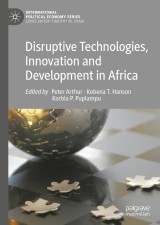Details

Disruptive Technologies, Innovation and Development in Africa
International Political Economy Series
|
128,39 € |
|
| Verlag: | Palgrave Macmillan |
| Format: | |
| Veröffentl.: | 29.05.2020 |
| ISBN/EAN: | 9783030406479 |
| Sprache: | englisch |
Dieses eBook enthält ein Wasserzeichen.
Beschreibungen
<p>This book examines how disruptive technologies and innovation underpin the attainment of a broader development agenda in Africa. Contributors show how distinctive forms of technological innovation can impact critical development processes. For example, disruptive technologies can deepen the ongoing democratic and governance waves in Africa, specifically in the area of contested elections. Similarly, innovations in agriculture, the environment and energy promote changes in value chain agriculture, and the use of sensors to manage e-waste and sustainable energy conservation are also transforming established practices. Furthermore, the role of disruptive technologies and innovation in education, health, financial services and the nature of paid work cannot be ignored. Individually and collectively, the authors discuss and highlight the mechanisms and initiatives that can contribute to the realization of the development goals of African countries, especially in a period where disruptive technologies are rapidly changing how things are done. As a result, this book, which represents one of the most recent systematic efforts to bring together dialogue on disruptive technologies in Africa, will be of particular use and benefit to a wide and an eclectic audience.</p>
1. Disruptive Technologies, Innovation and Transformation in Africa: The Present and Future.- 2. Disruptive Technologies, Democracy, Governance, and National Elections in Africa: Back to the Future?.- 3. Agricultural Research and Innovation: Disruptive Technologies and Value Chain Development in Africa.- 4. Disruptive Technologies and Scientific Innovations: Integrated Smart Sensors, Pollution and E-waste in Africa.- 5. Disruptive Technologies, Sustainable Energy Generation and Storage as Forms of Green Economy.- 6. Disruptive Technologies and the African Health Care Crisis: A Path to Sustainability.- 7. Disruptive Technology and Knowledge Development: African Universities, Human Capital and Educating for Global Citizenship.- 8. Disruptive Financial Technology (FinTech) and Entrepreneurship in Burkina Faso.- 9. Disruptive Technology, Mobile Money and Financial Mobilization in Africa: M-Pesa as Kenya’s Solution to Global Financial Exclusion?.- 10. SMEs, Industrialization and DisruptiveTechnologies in Africa: Enabling or Constraining?.- 11. Disruptive Technology, Foreign Direct Investment and Private Sector Development Policies in Africa.- 12. Perspectives on Disruptive Innovations and Africa’s Services Sector.- 13. Automation of Knowledge Work and Africa’s Transformation Agenda: Threats, Opportunities and Possibilities.- 14. Digital Transformation: A Connected and ‘Disrupted’ Africa. <br>
<p> <b>Peter Arthur</b> is an Associate Professor of Political Science and International Development Studies at Dalhousie University, Nova Scotia, Canada.</p>
<p> <b>Kobena T. </b><b>Hanson</b> is Principal Evaluation Capacity Development Officer at the African Development Bank in Abidjan, Côte d’Ivoire.</p>
<p> <b>Korbla P. Puplampu </b>teaches<b> </b>in the Department of Sociology at Grant MacEwan University, Canada.</p><br><br>
<p> <b>Kobena T. </b><b>Hanson</b> is Principal Evaluation Capacity Development Officer at the African Development Bank in Abidjan, Côte d’Ivoire.</p>
<p> <b>Korbla P. Puplampu </b>teaches<b> </b>in the Department of Sociology at Grant MacEwan University, Canada.</p><br><br>
<div><p>This book examines how disruptive technologies and innovation underpin the attainment of a broader development agenda in Africa. Contributors show how distinctive forms of technological innovation can impact critical development processes. For example, disruptive technologies can deepen the ongoing democratic and governance waves in Africa, specifically in the area of contested elections. Similarly, innovations in agriculture, the environment and energy promote changes in value chain agriculture, and the use of sensors to manage e-waste and sustainable energy conservation are also transforming established practices. Furthermore, the role of disruptive technologies and innovation in education, health, financial services and the nature of paid work cannot be ignored. Individually and collectively, the authors discuss and highlight the mechanisms and initiatives that can contribute to the realization of the development goals of African countries, especially in a period wheredisruptive technologies are rapidly changing how things are done. As a result, this book, which represents one of the most recent systematic efforts to bring together dialogue on disruptive technologies in Africa, will be of particular use and benefit to a wide and an eclectic audience.</p></div><div><b>Peter Arthur</b> is an Associate Professor of Political Science and International Development Studies at Dalhousie University, Nova Scotia, Canada.<p> <b>Kobena T. </b><b>Hanson</b> is Principal Evaluation Capacity Development Officer at the African Development Bank in Abidjan, Côte d’Ivoire.</p><p> <b>Korbla P. Puplampu </b>teaches in the Department of Sociology at Grant MacEwan University, Canada.</p><div><br></div></div>
Enhances our understanding of the role of disruptive technologies and innovation in Africa Addresses governance and human capital issues in national elections, higher education and human capital development Identifies the implications and disruptive possibilities of development initiatives through demonstrated cases of successes and failures of technology and innovation
Diese Produkte könnten Sie auch interessieren:

How Insights from Moral Psychology and Character Research can aid Development Cooperation

von: Jan Prothmann

13,99 €















